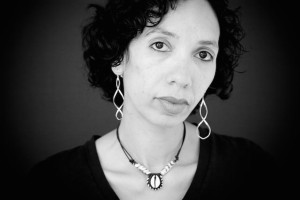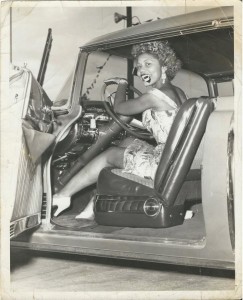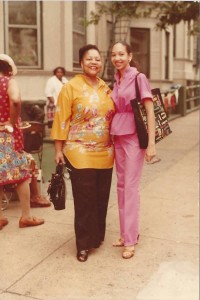 FPP spoke via email with Harlem-born & raised poet JP Howard about what it was like writing about her model mother Ruth King, her Audre Lorde and James Baldwin work, and much more. Read Howard’s interview then plan to her read on Tuesday, September 12th at Silvana (116th & Frederick Douglass) in Harlem.
FPP spoke via email with Harlem-born & raised poet JP Howard about what it was like writing about her model mother Ruth King, her Audre Lorde and James Baldwin work, and much more. Read Howard’s interview then plan to her read on Tuesday, September 12th at Silvana (116th & Frederick Douglass) in Harlem.
SPD called your debut collection SAY/MIRROR a “socio-historical-emotional” retelling of the life of a diva through a daughter’s eyes”. What was it like to create this book? Are there images or poems that stay close to you after publication?
 It was a really wonderful project to work on SAY/MIRROR and to have the opportunity to gather vintage modeling photos of my mother (Ruth King), who was a successful black model in the 1950s and 1940s and also to include some cherished family photos to complement my poems. I also used a few excerpts of found journals of my mom in a few of my poems. Using objects of significance is often a big part of my writing process including using photos, cherished family objects and written and oral histories to work their way into poems. My Mom lived to see the first edition of the book and passed away in December 2015
It was a really wonderful project to work on SAY/MIRROR and to have the opportunity to gather vintage modeling photos of my mother (Ruth King), who was a successful black model in the 1950s and 1940s and also to include some cherished family photos to complement my poems. I also used a few excerpts of found journals of my mom in a few of my poems. Using objects of significance is often a big part of my writing process including using photos, cherished family objects and written and oral histories to work their way into poems. My Mom lived to see the first edition of the book and passed away in December 2015  the first year the book was published. My editor, Lynne DeSilva-Johnson of The Operating System was so generous and invited me to add more poems and include a memorial to my Mama in the second expanded-edition released last year. One of poems that stays close to me, even now is “What to Say to A Friend Who Wants to Give Up”. I’ve experienced a lot of loss, both personally and in my extended poetry community since losing my Mom, so that poem about What to Say to a Friend has taken on even greater meaning since I wrote it. So many folks have responded to and asked to share it. It’s now one of my signature poems and can be found republished on the HIV Here and Now Project.
the first year the book was published. My editor, Lynne DeSilva-Johnson of The Operating System was so generous and invited me to add more poems and include a memorial to my Mama in the second expanded-edition released last year. One of poems that stays close to me, even now is “What to Say to A Friend Who Wants to Give Up”. I’ve experienced a lot of loss, both personally and in my extended poetry community since losing my Mom, so that poem about What to Say to a Friend has taken on even greater meaning since I wrote it. So many folks have responded to and asked to share it. It’s now one of my signature poems and can be found republished on the HIV Here and Now Project.
What to Say to a Friend Who Wants to Give Up
Say I love you, even when you can’t love yourself.
Say please, please not today,
Say too much life unlived.
Say mirror, say beautiful,
Say this arm, take this arm,
Say grab, say hold, say let tears fall,
Say tears heal, Say forgive your mama,
Say she did the best she could.
Say tomorrow, say sleep,
Say split second, split the seconds,
Say let the seconds turn into days,
Say today, Say tomorrow, Say sun.
Say warm, Say skin,
Say warm skin, say sunlight,
Say new day, Say breathe,
Say inhale, Say exhale.
Say not today baby girl,
Say so much life to live,
Say love, Say I love you.
Say hold on, hold on to love.
In addition to being a poet and a teacher, you are a public interest attorney (!). Please tell us about these intersections, how your different roles inform one another.
Since I deal with the public all day in court, literally some days I can interact with between 50 and 100 people (litigants and attorneys) I’m incredibly patient and also really great at multi-tasking—a bit out of necessity and a bit out of habit. I think having my day job as a public interest attorney really helps me appreciate my creative life and creative work as a poet and educator. The attorney role doesn’t necessarily intersect with my creative life, but it does give me a greater appreciation for my creative work.
Tell us about your Audre Lorde & James Baldwin work.
I had the honor to facilitate an inaugural “James Baldwin’s America” Humanities New York readings and discussion group for The Brooklyn Community Pride Center in 2016 and facilitated it again in 2017. It was a wonderful opportunity to blend current day politics with the brilliant essays and novels of Baldwin and discuss with a diverse community of thinkers.
I’ve been commissioned by Humanities New York to be a scholar-advisor to create an Audre Lorde Readings & Discussions series. This includes creating a full syllabus, book list, & introductory series essay which will be used as part of a toolkit across New York State. It’s an exciting project which I’m in the process of completing.
You are a native-born Harlemite. What are some of your earliest impressions of your legendary hometown?
Oh my heart will always be in Sugar Hill, Harlem no matter where I live. Because my family had such longstanding roots in Harlem, I grew up learning about the Harlem Renaissance and the great writers who had rolled through Harlem over the years. My idea for starting Women Writers in Bloom Poetry Salon came from learning about the great Harlem literary salons that often moved from home to hone with great writers such as Zora Neale Hurston, Langston Hughes and so many other influential black writers. Every month I pay homage to them when I host my literary salon.
What does your Harlem heritage mean for your writing, your work?
My Harlem heritage means that it is a place that I always carry with me and often visit or revisit in much of my writing. I think to learn from the past, we have to often revisit it or honor/recognize the role it serves in our lives. For me all the best parts of growing up in Harlem are still a part of me, double dutch with my friends on the sidewalk in front of the apartment building where I lived, talent shows at the Apollo, learning to tap dance at Grace Giles dance school on 125th Street, Sundays at Abyssinian Baptist Church, sweet potato pie and delicious meals at the original Red Rooster Restaurant after church each Sunday with Mama and the church ladies. There was 8 year-old Juliet reciting Margaret Walker‘s poem “For My People” before church in the basement to the ushers and church ladies while Mama stood by proudly watching and encouraging me. I may have moved from Harlem physically, but Harlem is all up in me.
Tell us about your Harlem, 2017.
Harlem 2017 is so different. Sometimes I can hardly recognize it. However, I am grateful that each summer I am able to return to the block I grew up on, 149th and Convent Ave, to host my summer BBQ Salons. Every summer now there is poetry family, a powerful open mic, brilliant creative minds, delicious food grilling on the grill and it always feels like a welcome nod to the Harlem that once was when I return each summer but with some current day poetry swag and Leo flare. I’m grateful to my childhood friend Stephanie Penceal who has opened her home and her building’s garden courtyard to the Salon community for these last six years.
When do you feel most “we” and most “I”? Is there a time you truly feel first person plural?
I feel most “we” when collaborating with community, which is often, as a curator of a literary salon. That feeling of “we” keeps me going and often inspires me. I feel most “I” when I am alone and in my writing “space” – really that mental space is what I’m talking about. I think when I am with my Salon community I truly feel that sense of “we” of being a part of a larger community/creative family. It’s a great feeling and definitely inspires me.
What urgent advice would you offer emerging writers?
Find a supportive writing community where you can get helpful feedback on your writing, that allows you to share work and really soar as a writer. Community is important -particularly a community that will uplift you and help you to become a better and more effective writer.
Would you share any books, art, music, food that we must seek out right this moment?
Listen to anything by the musician and filmmaker Be Steadwell! Her latest album “Breakup Songs” is amazing. She often says: “I am an activist because I am a black, queer, woman singing about love. I believe that is radical” and her music speaks to this all the time.
Right now one of my favorite books is t’ai freedom ford‘s debut poetry collection “how to get over” and of course I’ve been revisiting everything by Audre Lorde, especially her essays, since working on the Audre Lorde syllabus and essays. I highly recommend the Black Power! exhibition at the Schomburg Center for Research in Black Culture. It’s there until the end of the year and is part of their yearlong examination into the 50th anniversary of the Black Power Movement. Some amazing and influential poets who were part of the Black Power Movement, including Sonia Sanchez, Nikki Giovanni and the late Amiri Baraka, are included in this necessary exhibit.
